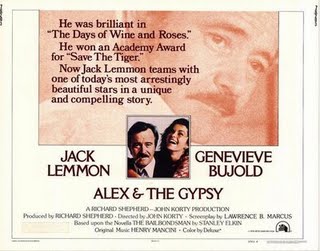
ALEX AND THE GYPSY
US, 1976, 99 minutes, Colour.
Jack Lemmon, Genevieve Bujold, James Woods, Robert Emhardt.
Directed by John Korty.
Alex and the Gypsy is an odd piece of Americana. After Save the Tiger, The Entertainer, Jack Lemon is cornering the role of the isolated middle-aged man, seedy and disillusioned with nowhere to go. Playing the role of a bail-bondsman in a small town, he gets the chance to make a decision when confronted by the strange gypsy girl he had loved but who had abandoned him six years earlier. Responding in exasperation and fascination, he realizes the limits of his humdrum existence, his petty ridiculing of his assistant and the heady possibilities of throwing it all away and joining the gypsy. Not always convincing and perhaps of limited appeal, the film also stars the attractive Genevieve Bujold.
1. The focus of the title on the persons? Contrast? The original novel title was The Bail Bondsman. Indications of themes and tones?
2. For what particular audience was the film made? Men, women? Middle-aged audience, younger? American, non-American?
3. The importance of the small town atmosphere, the look of the town, its way of life? A microcosm for the rest of America? A town for this kind of message film?
4. The hard edge of the film: prisons, the work of the bail-bondsman, the background of the Mafia, the release of the criminal, murder? How was this balanced and counterpointed with the more sentimental tones, Alex's relation to the gypsy, nostalgia for the past, hope for a carefree future? Did the hard and the sentimental blend well?
5. What kind of man was Alexander Main? Late middle age, as portrayed by Jack Lemmon? His shock, work, presence in the prisons? His attitude towards money? Cynical approach towards life, money making, his own conscience? Seeing him in action with the prison? With the officials? A lonely man? Living in a rut, his cruel streak? His hold over Crain Bool and his treatment of him? How sympathetic a man, how credible?
6. The release of Morgan, the background of the Mafia, Alexander's wanting money? The later turning up of the dead body? Questions of conscience, his bluntness of conscience?
7. Genevieve Bujold as Maritza? His first meeting her in the prison, as she appeared in the atmosphere of the jail, encountering him, pleading with him, the attempted murder charge? The pressures for his putting up the money? The question of a large amount of money? The memories for both and the ways these were visualised, a lyrical tone compared with the harsh present? The ordinariness and the extraordinariness of their meeting, the humour of the wedding, the encounter between the two, the affair? Maritza as a gypsy, way of life, attitudes? The growing bonds between them? What they did for each other? The fact that they were two losers? The effect on each of them?
8. Crain Bool as a focus of attention, especially for Alex? Neurotic, abused? The fact that he was a thief and protected by Alex? The butt of Alex's anger, being physically wounded?
9. The sequence where Alex confronted Hammond? The atmosphere of the shock? Interrogation, taping the confession? The irony of the chase and using the tape? A sign of activity and activeness in Alex's life?
10. Maritza's various escapes, her presence at the funeral, Alex's taking her back again?
11. What happened between the two that changed Alex's mind, the contrast with the humour of his having her in handcuffs (and the comic side of this?) Their sleeping together, his letting her escape, the message on the mirror?
12. The sequence at the airstrip? Her going to freedom? His abandoning his past, getting our of the rut and going to freedom?
13. Themes of human nature, age, tiredness, being in a rut, human cruelty, human love?